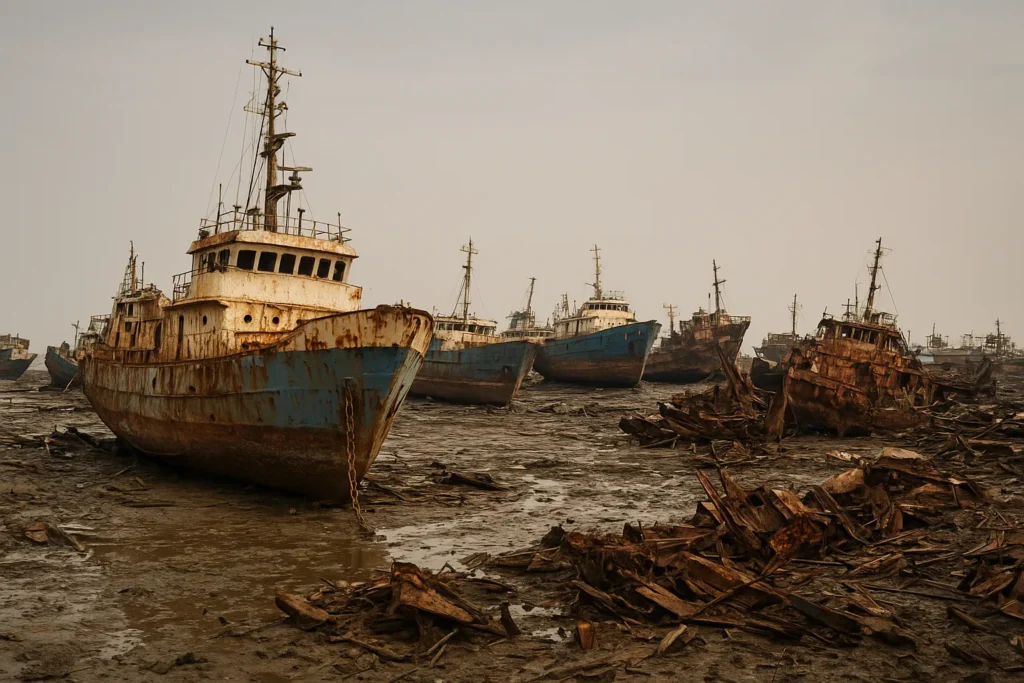Ship Disposal Planning: The Retirement Plan Every Vessel Needs

Every ship has a final berth, a place where it ends its active life and begins the process of Disposal. Disposal Planning is the careful preparation needed to ensure this stage happens smoothly, safely and without surprise costs. Without it, ship owners’ risk costly delays and a bureaucratic tangle that would make even the calmest captain reach for a stiff drink, they also risk environmental damage.
Proper Disposal Planning covers more than just scrapping steel. It involves understanding the ship’s condition, its hazardous materials and the legal steps needed to meet strict environmental and safety regulations. This planning also helps identify reusable parts and valuable materials, turning what seems like waste into recoverable assets. It’s a complex job that demands detailed knowledge and precise timing — and that’s where experts come in.
Neglecting Disposal Planning can leave ships stuck in ports or yards, racking up fees while regulators tighten the rules. Worse, it can harm workers or pollute sensitive waters. The stakes are high, making Disposal Planning a vital part of a ship’s lifecycle. It is not just about where a ship ends up, it is about how it gets there.
What Happens When Disposal Planning Goes Overboard
Disposal Planning might sound dull but getting it wrong can cause a tidal wave of problems. When ships are scrapped without proper care, the consequences reach far beyond the scrapyard.
Here are the main risks when Disposal Planning goes overboard:
- Hazardous waste leaks polluting sea and soil
- Heavy fines and project shutdowns from breaking regulations
- Loss of valuable materials and parts
- Unsafe working conditions causing accidents
- Damage to company reputation and public trust
- Costly delays piling up harbour fees and storage costs
The fallout from poor Disposal Planning is both costly and avoidable. It can tie up ships for years, strain budgets and create headaches for everyone involved. Good Disposal Planning helps avoid these pitfalls by making sure the ship’s final journey is safe, legal and efficient. In short, it keeps the whole process shipshape and above water.
The video below offers a stark visual lesson in the consequences of neglecting proper Disposal Planning. It showcases the hazardous conditions of ship graveyards, where vessels are dismantled without adequate safety measures or environmental safeguards.
Is this the most dangerous job in the world? Inside Bangladesh’s ship graveyards
Quorum’s Role in a Ship’s Smooth Retirement
With over 25 years of experience, Quorum has become a trusted name in Support Engineering. Our expertise helps defence teams and commercial clients keep complex systems and products running smoothly throughout their lifecycle, and crucially, plan their retirement properly.
Disposal Planning is not an afterthought at Quorum. It is a key part of our broad support plans. We work closely with clients to assess risks, manage hazardous materials and ensure compliance with strict regulations, which means ships don’t just end up on a scrapyard by chance, but follow a carefully charted course to a safe and cost-effective Disposal.
Our role is to take the worry off clients’ shoulders by handling the tricky bits before they become problems. We ensure every step is logged, every rule is followed and every asset is accounted for. With Quorum steering the process, ship retirement is less of a headache and more of a smooth, well-executed handover.
Avoiding Bureaucratic Icebergs: Early Planning Saves Time and Money
Setting sail without a Disposal plan is like navigating icy waters without a map, you are bound to hit trouble. Early planning helps avoid the kind of bureaucratic icebergs that can stop a project dead in its tracks. When Disposal is left to the last minute, delays pile up, costs soar and no one enjoys the waiting game.
Defence regulations around ship Disposal are notoriously strict, and for good reason. They cover everything from handling hazardous materials to protecting sensitive information, ensuring safety and security at every step.
Ignoring these rules is not an option, it can lead to hefty fines, project delays or worse, a breach of national security. Navigating this maze of regulations requires specialist knowledge and careful attention to detail. That is why Quorum’s expertise is invaluable, guiding clients through the red tape so the final stages of a ship’s life meet all legal and safety standards without fuss.
By getting ahead of the paperwork and compliance checks, shipowners dodge unnecessary fines and costly hold-ups. Early action means hazardous materials are identified and handled properly, and all legal boxes are ticked before the final voyage begins. It is the difference between smooth sailing and being stuck in port, watching the clock and the fees tick away.
Good planning isn’t just about avoiding disaster. It also keeps budgets in check and operations efficient. With Quorum’s experience, clients get clear guidance on timelines, risks and costs so there are no surprises. Proper Disposal Planning makes retirement straightforward, safe and economical.
Book an informal chat with Shaun for a free consultation and discover how ILS can propel your operational efficiency and cost-effectiveness to new heights.
Your support engineering insights…



